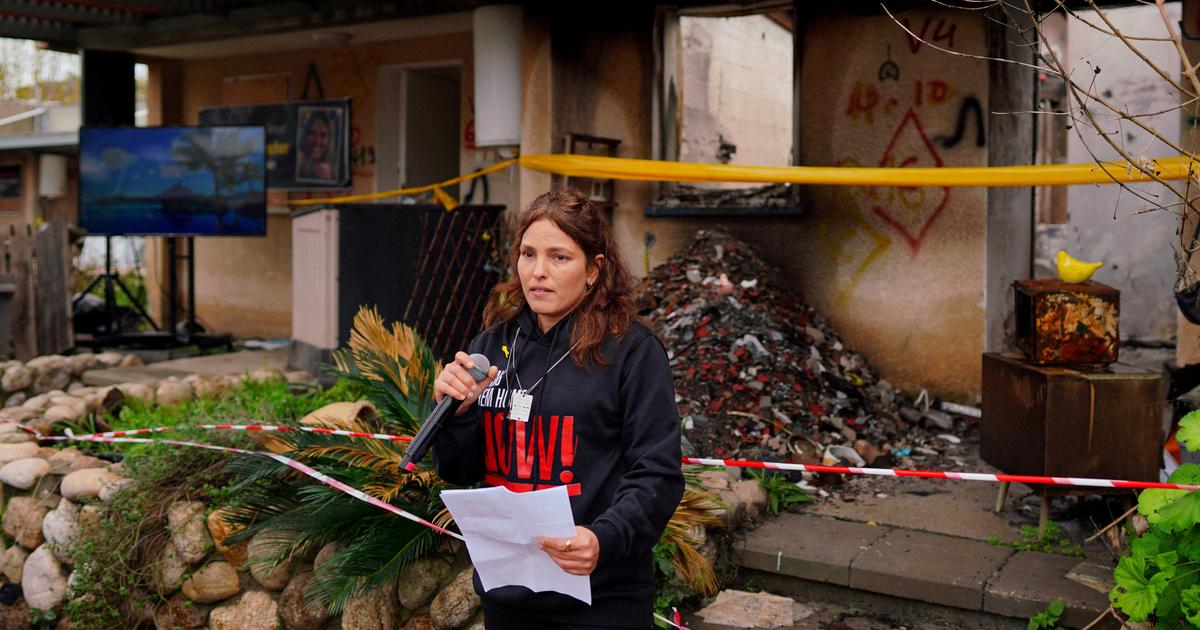We need better methods of prosecuting sexual assaults in conflict
Created: 05/12/2022, 23:21
From: Foreign Policy
Sexual violence: who thinks about the victims?
(Iconic image) © Rolf Poss/Imago
Although rape is one of the most common war crimes committed, it is rarely considered by international courts.
Pristina - After many years of organizing in the United States, Kosovar survivors of sexual violence during the 1998-1999 Kosovo war are urging US President Joe Biden to hold the Serbian government to redress and accountability.
An estimated 20,000 rapes of Kosovar women were committed by Serbian soldiers and police officers during the conflict, but to date only one has been prosecuted by a court and that case is now on appeal.
According to Human Rights Watch, the attacks may have been designed to "dissuade women from future procreation," suggesting genocidal intent.
Sexual violence: Perpetrators should be held accountable
In a letter sent to Biden in December by Democratic Congressman Adriano Espaillat of New York and 15 of his colleagues, they called on the government to urge Serbian President Aleksander Vucic to bring the perpetrators who raped and tortured Kosovar women to justice to deliver.
They cited the case of Vasfije Krasniqi Goodman, a Kosovo-born US citizen who was raped by a Serbian police officer in her village in 1999 as a 16-year-old girl.
Goodman, the first woman to go public with her rape in Kosovo, testified before Congress in 2019 and gave an emotional account of her abuse.
The letter also addressed other alleged crimes against humanity committed during the conflict, including the case of three Kosovar Americans who were executed in Serbia in 1999.
Sexual violence in the Kosovo war: only a few perpetrators prosecuted
Despite the well-documented human rights violations and high death toll, only six men have been found guilty by the International Criminal Tribunal for the former Yugoslavia (ICTY) for crimes committed during the Kosovo war.
And the panel has completely failed to prosecute perpetrators of sexual violence in this conflict.
Local courts in Kosovo have only just begun prosecuting war crimes.
Last year, the first verdict for a sex crime against a Serbian police officer was passed in Pristina.
Unfortunately, this just follows a general trend.
Although rape and sexual assault during conflict are legally considered atrocities, they are rarely prosecuted by international and domestic courts.
But Biden now has the opportunity to initiate a course correction by responding to the MPs' letter.
Sexual violence: For a long time, rapes were not prosecuted at all
Most of the landmark international jurisprudence on sexual violence stems from ad hoc tribunals.
The first international treaty that implicitly outlawed sexual violence was the 1907 Hague Convention. Article 46 of the document states that “the honor and rights of the family” must be respected.
However, this did not end the impunity for conflict-related crimes of sexual violence.
In fact, rape and sexual assault were never prosecuted in either the Nuremberg or Tokyo courts after World War II, although Japanese authorities raped and imprisoned an estimated 200,000 women in the Asian theater of war throughout the war.
Korean and other women enslaved by the Japanese have not been able to obtain justice in later court cases either.
Just last year, a South Korean court upheld Japan's immunity and dismissed victims' claims against the Japanese government for compensation.
The Japanese government has refused to apologize for these crimes, claiming that the issue of legal responsibility has been settled in previous deals with South Korea.
There has been no justice for the remaining survivors for more than 70 years.
Sexual violence: "Women must be protected from rape"
In 1949, the United Nations passed the groundbreaking Geneva Conventions, which set standards for the treatment of civilians in wartime.
Among other things, it says: “Women are to be protected in particular from rape, forced prostitution and any form of immoral coercion.” But it was only during the wars during the breakup of the former Yugoslavia that two female survivors of sexual assaults, Jadranka Cigelj and Nusreta Sivac, reconciled invoked this line to take legal action.
After their rescue from the camps in 1992, Cigelj and Sivac, both lawyers, collected over 200 testimonies from women who had been raped by Bosnian Serbs.
They submitted the evidence to the International Criminal Tribunal for the former Yugoslavia (ICTY) and persuaded prosecutors to act on the testimony and include the crimes of sexual violence committed during the conflict.
Sexual Violence in the Bosnian War: Concentration Camps and Acts Against Men
During the 1992-1995 Bosnian War, Bosnian Serb forces took strategic action against women, children and many men held in concentration camps.
The worst incident of this kind occurred in 1992 in the Luka concentration camp in the city of Brcko, where Bosnian Serb authorities imprisoned Bosnian Muslims and Bosnian Croats.
Many of the male survivors have rarely spoken about their experiences given the taboos surrounding male sexual abuse.
The main perpetrators of these atrocities were Goran Jelisic and Monika Karan, a couple bent on sadistic torture and murder.
While Jelisic was one of the first to be arrested and charged by the ICTY in 1999, Karan went undetected.
She was a teenager when she committed the atrocities.
She later changed her identity and continued to live in the Republika Srpska, the Serbian part of Bosnia and Herzegovina.
Karan was arrested in 2011 and sentenced to four years in prison by a court in Brcko for war crimes against civilians.
She was released in early 2014 and reintegrated into society.
Sexual violence: landmark international jurisprudence achieved
In all, the ICTY charged more than 70 people with crimes of sexual violence, including sexual assault and rape, ultimately convicting 32 of them.
This led to landmark international case law on sexual violence in conflict.
In several cases since 2000, the Court has classified rape as a crime against humanity, torture and a means of terror, and made a clear link between rape and ethnic cleansing.
However, the ICTY could not find that rape was a component of the genocide, despite an estimated 50,000 rapes being committed during the Bosnian War.
The landmark precedent declaring rape a war crime was established in 1998 by the International Criminal Tribunal for Rwanda (ICTR).
Established in 1994, the tribunal worked in parallel with the ICTY.
Their jurisprudence overlapped and complemented one another.
During the genocide in Rwanda in 1994, around half a million Tutsi women and children were raped, sexually mutilated or murdered by extremist Hutu gangs and the police within 100 days.
In 1998, Jean Paul Akayesu, the mayor of Taba Municipality, became the first person to be convicted for ordering the rape of Tutsi, setting the precedent that rape and sexual violence can constitute genocide.
This was then used to condemn Pauline Nyiramasuhuko, then Rwanda's Minister of Family Affairs and Women's Empowerment, who ordered the rape and murder of Tutsi women and girls.
Sexual violence: DR Congo's vice president convicted
The International Criminal Court (ICC) first convicted Jean Pierre Bemba Gombo, former Vice President of the Democratic Republic of the Congo, in 2016 for sex crimes committed during the 2002-2003 conflict in the Central African Republic.
But in 2018, to the dismay of survivors and human rights activists, Bemba was acquitted of all charges by the Appeals Chamber.
In 2019, Congolese rebel leader Bosco Ntaganda was convicted of crimes committed in the DRC in 2003, including sexual slavery and rape.
This time the judgment was upheld by the Appeals Chamber.
It is considered a landmark conviction for wartime rape.
More recently, following the fall of Sinjar province in 2014, the Yazidi community in Iraq faced horrific crimes at the hands of members of the Islamic State.
In 2016, the UN-appointed Independent International Commission of Inquiry released a report calling the crimes perpetrated against the Yazidis "unimaginable horrors" and stating that the acts collectively constitute genocide.
Sexual violence: German court sentences IS member
In 2021, Iraq's Council of Representatives passed the Yazidi Survivors Act, which aims to pave the way for Islamic State's prosecution of sex crimes and human trafficking in Iraqi courts.
The law provides compensation for the Yazidi, Christian, Turkmen and Shabak minorities and supports education, health services and a universal basic income for these communities.
In 2021, a German court convicted an Islamic State member of genocide and crimes against humanity but did not address the alleged sex crimes.
The enslavement and trafficking of Yazidi women and other sex crimes must be addressed in future trials.
Sexual Violence: More Examples of Systematic War Campaigns
Also last year, reports surfaced of a systematic rape campaign by Ethiopian government forces against women in Tigray province during Ethiopia's ongoing civil war.
During a session of the Ethiopian Parliament on sexual violence in Tigray, Prime Minister Abiy Ahmed denied the seriousness of the allegations, saying: “The women of Tigray?
These women have only been penetrated by men, while our soldiers have been penetrated by knives.” Similarly, survivors of concentration camps in China's Xinjiang province have pointed to systematic sexual violence and rape as torture tactics used against the Uyghur prisoners.
In 2021, Ethiopia's Attorney General's Office prosecuted four Ethiopian soldiers, three of whom were found guilty of rape and one of whom was convicted of killing a civilian in the Tigray region.
In addition, 28 Ethiopian soldiers are on trial for killing civilians and 25 for sexual violence and rape.
Ukraine war: reports of rapes
Just last week, the ICC announced that it would launch an investigation into alleged war crimes, including rape, committed in Ukraine since 2013.
It was then that protests against Russian-backed President Viktor Yanukovych began, which were soon followed by the Russian annexation of the Crimean Peninsula and unrest in eastern Ukraine.
There have been reports of renewed sexual assaults since the start of the Ukraine war last month.
The vast majority of survivors and their families will never receive justice.
This is because heads of state often lack the political will to prosecute these crimes in the courts they oversee.
As a result, there are few courts that have jurisdiction over sexual violence in war.
Sexual violence: who thinks about the victims?
Despite the best efforts of the United Nations Women, Peace and Security apparatus, survivors of sexual violence in conflict are generally underserved by the public agencies responsible for reparation and medical care for survivors of wartime sexual violence.
While Bosnia and Herzegovina survivors have a legal right to care and compensation under a national reparation program, the country has underperformed by international standards.
Survivors were sometimes only awarded damages if they had the rare opportunity to participate in a criminal trial.
The survivors of these crimes deserve
that prosecution be carried out within a reasonable time.
The international community must increase its political will to prevent sexual violence in conflict.
In 2019, Nobel Prize winners Denis Mukwege and Nadia Mura founded the Global Survivors Fund, which is conducting a study on the status and possibilities of reparation for survivors of sexual violence in more than 20 countries.
A preliminary report was presented at the 76th session of the UN General Assembly last year.
Supporting the implementation of the Global Survivors Fund's recommendations at the next UN General Assembly in September will be a major step forward towards global redress.
Denis Mukwege: a doctor from the Democratic Republic of Congo who specializes in treating victims of rape and extreme sexual violence.
Mukwege received the 2018 Nobel Peace Prize. © Christian Lutz/AP/dpa
All tribunals, including the International Criminal Court and regional courts such as the Inter-American Court of Human Rights, the European Court of Human Rights, the African Court of Human and Peoples' Rights and the Kosovo Special Chambers, should be staffed with trained jurists and psychologists, who will be provided with witnesses workers who have suffered sexual violence.
This is not just a niche cohort, as sexual violence against all genders has been widespread in almost every conflict of the past 25 years.
The Court of Kosovo Special Chambers and Special Prosecutor's Office (KSC and SPO) is a court in Kosovo staffed with international judges and prosecutors responsible for prosecuting all war crimes committed during the war in Kosovo.
The court can operate both in Kosovo and from a courtroom in The Hague.
To date, however, the KSC and SPO have not charged or convicted any Serb perpetrators of rape crimes in Kosovo.
Legal scholar Paul Williams of American University's Washington College of Law has proposed extending prosecutions to war crimes such as rape and wartime sexual violence.
Sexual Violence: What Joe Biden Should Do Now
In response to Goodman's plea for justice, Biden should direct the US government to take immediate action to assist in the prosecution of perpetrators of sexual violence against Albanian women during the Kosovo war, under the auspices of the KSO and SPO.
The United States should provide resources and staff for attorneys and mental health workers to work with all victims, regardless of their current citizenship.
This requires the willingness of the Serbian government, which is a major challenge given that Belgrade has refused to cooperate with the KSO and SPO in many cases.
Serbia does not recognize Kosovo but has cooperated with the KSO and SPO in some cases involving Serb victims.
Vucic does not admit that rape was a strategy used by Serbian forces against the Kosovars, and getting him to do so will likely require significant pressure from the US State Department.
The United States can initially support the dialogue between Serbia and Kosovo and urge Serbia to recognize Kosovo or at least to abandon its blocking stance that has prevented Kosovo from becoming a member of international bodies such as the United Nations and the Organization for Security and Co-operation in Europe to become.
The lack of affiliation with these groups has implications for the forms of legal protection available to Kosovars.
Washington must continue to place human rights at the heart of its foreign policy, as well as in the strategic plans for the US embassies in Pristina and Belgrade.
Goodman brought her case with extraordinary courage and deserves to stand trial alongside hundreds of other women who were raped during the Kosovo war.
More than 20 years after this miscarriage of justice, it is now time for accountability.
By Hikmet Karcic and Tanya L. Domi
Hikmet Karcic
is a genocide and Holocaust researcher based in Sarajevo, Bosnia and Herzegovina.
He was a 2017 Global Fellow of the Auschwitz Institute and Keene State College.
His articles on genocide denial and atrocity prevention have appeared in Haaretz, Newsweek and Arab News.
Twitter: @hikmet_karcic
Tanya L. Domi
is an Assistant Professor of International and Public Affairs at Columbia University and a Senior Fellow at the Alliance for Peacebuilding in Washington.
Twitter: @tanyadomi
This article was first published in English in the magazine "ForeignPolicy.com" on March 9, 2022 - as part of a cooperation, it is now also available in translation to the readers of the IPPEN.MEDIA portals. *Merkur.de is an offer from IPPEN.MEDIA.
Foreign Policy Logo © ForeignPolicy.com



/cloudfront-eu-central-1.images.arcpublishing.com/prisa/NXAN6ORR7JECNIMY7N6WRPH3XA.jpg)





